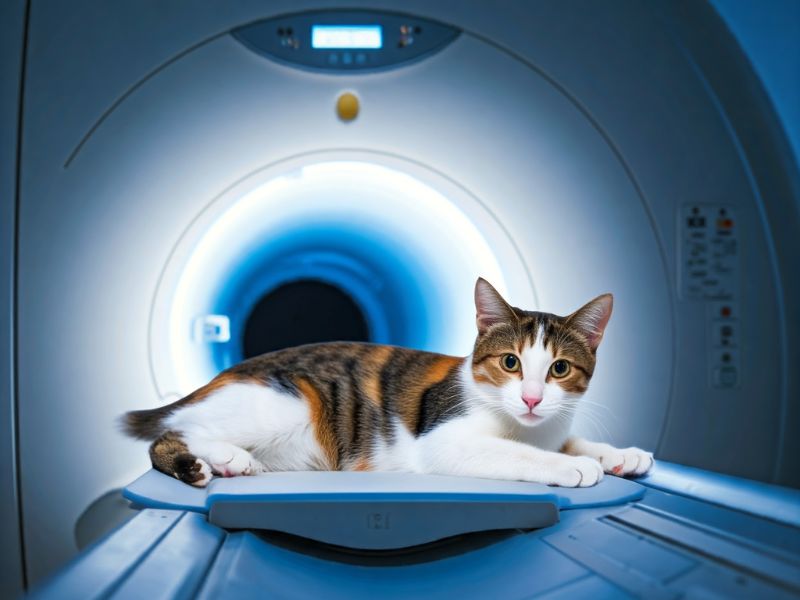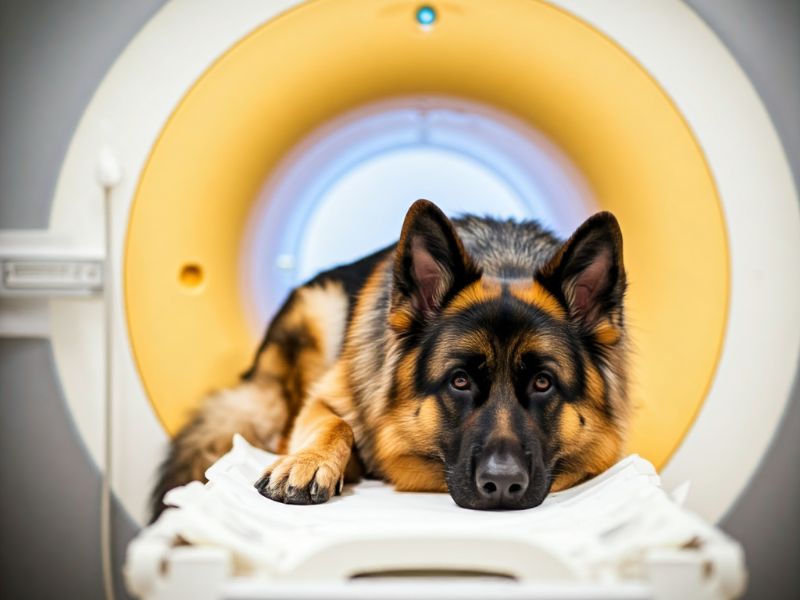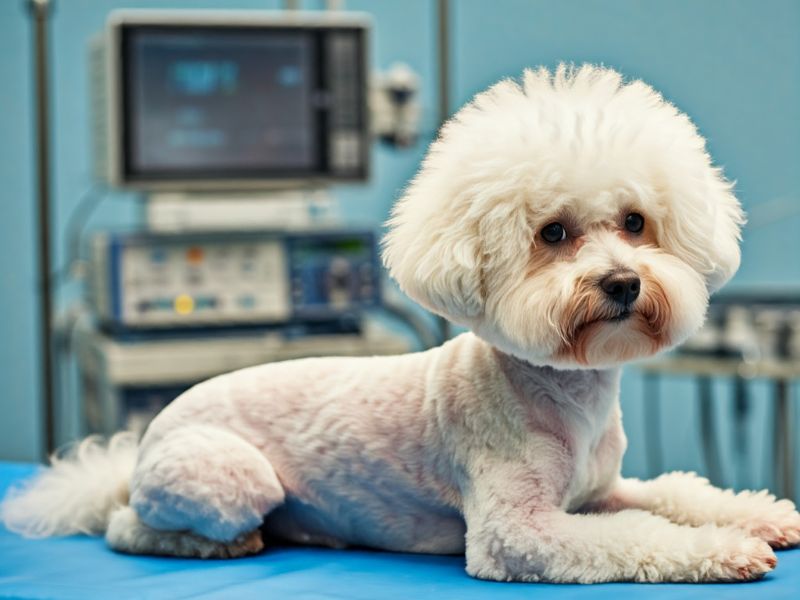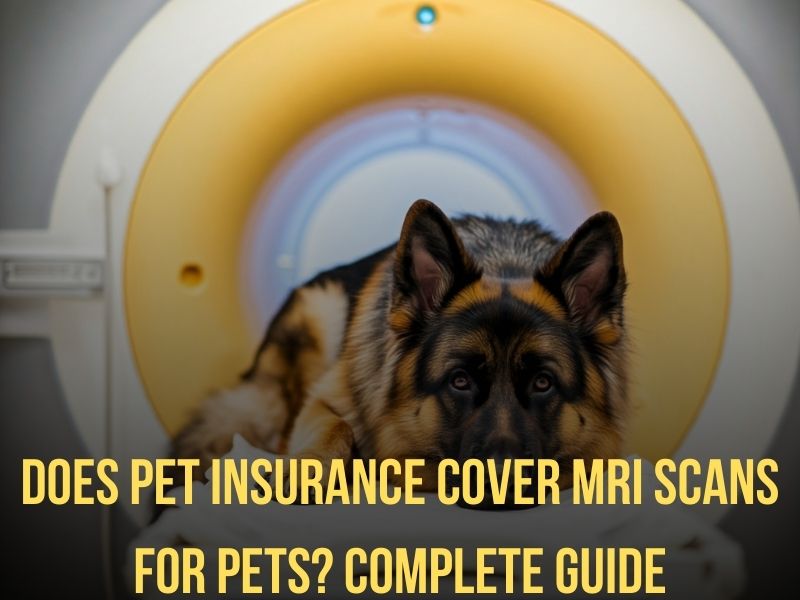When our pets are unwell, we want to do everything we can to ensure they get the best care possible.
Just like in human medicine, veterinarians sometimes use advanced imaging, like MRI (Magnetic Resonance Imaging), to get a clear view of what’s going on inside your pet’s body.
But with high-quality care comes a higher price tag, especially for specialized services like MRIs.
A common question pet owners have is: does pet insurance cover MRI scans? Let’s dive into this topic and see what pet insurance can cover when it comes to MRIs for pets.
Key Points
- Pet insurance can cover MRI scans, but it depends on the type of policy you have—comprehensive plans usually offer the most coverage.
- MRIs are costly, often ranging from $1,500 to $4,000, making insurance coverage important for financial peace of mind.
- Coverage is not guaranteed for all situations; factors like pre-existing conditions, policy limits, and type of injury or illness can affect coverage.
- MRI scans are vital for diagnosing serious issues in pets, such as neurological and spinal problems.
- Consulting your insurer and reviewing policy details is essential to know what MRI-related expenses may be covered before an emergency happens.
Why Do Pets Need MRI Scans?
MRI scans aren’t just for people—pets can benefit from them too! An MRI scan provides detailed images of your pet’s internal organs, brain, and spine. They’re often used for diagnosing conditions like:
- Neurological issues (seizures, brain tumors, spinal problems)
- Soft tissue injuries
- Joint and ligament injuries
- Tumors and cancer assessments
While X-rays are great for seeing bones, MRIs are the go-to for a closer look at soft tissues, which makes them essential in certain cases.
If your pet’s health requires a deep, detailed look, an MRI can provide life-saving information for diagnosis and treatment.
What Is Pet Insurance?
Pet insurance is essentially health insurance for your furry friend. It helps cover medical expenses so you aren’t burdened with the full cost of treatment. Policies can vary, covering everything from routine check-ups to emergency surgeries.
But like with human health insurance, different plans offer different levels of coverage, which can affect whether specialized treatments like MRIs are covered.

Types of Coverage in Pet Insurance
Pet insurance plans typically offer several types of coverage, each focusing on different aspects of pet health:
- Accident-Only Coverage: Covers injuries from accidents but not illnesses. It’s generally more affordable but won’t cover MRI scans for conditions like tumors.
- Illness Coverage: Covers the treatment of illnesses such as cancer, infections, and chronic diseases. MRIs related to these conditions may be included.
- Comprehensive Coverage: This is the most inclusive, covering accidents, illnesses, and sometimes wellness care, such as vaccinations and dental cleanings.
Each type of coverage has its own benefits and limitations, and understanding these differences is essential when determining if MRI scans will be covered.
Does Pet Insurance Cover MRI Scans?
The short answer is: yes, some pet insurance policies do cover MRI scans, but not all. Whether or not an MRI is covered depends on the type of insurance policy you have and the reason for the MRI.
- Comprehensive plans usually offer MRI coverage for both accidents and illnesses.
- Accident-only plans might cover an MRI if your pet suffered a trauma (like a car accident) that necessitates it.
- Illness-only plans might cover MRI scans if they are part of diagnosing or treating a covered condition, like epilepsy or cancer.
However, it’s important to note that MRI coverage can vary significantly between providers, so you’ll need to check the specifics of your plan.
When Will MRI Scans Be Covered by Pet Insurance?
For an MRI scan to be covered by your pet insurance, it usually needs to meet specific conditions set by the insurance provider. Here are some scenarios where an MRI scan might be covered:
- Accidental Injuries: If your pet is injured in an accident, like being hit by a car or experiencing a major fall, many policies cover the MRI scan needed to assess injuries.
- Chronic Illnesses: For chronic issues, such as epilepsy or spinal conditions, an MRI might be covered as part of diagnosing or monitoring the condition.
- Cancer Diagnosis: If an MRI is required to confirm or assess cancer, many pet insurance plans include it under illness coverage.
- Neurological Concerns: If your pet experiences neurological symptoms, like seizures or loss of balance, an MRI can be essential for diagnosis and might be covered under illness or comprehensive plans.

When Might MRI Scans Not Be Covered?
While some pet insurance policies cover MRI scans, there are also situations where they may not be covered, such as:
- Pre-existing Conditions: If your pet had signs or a diagnosis of a condition before the policy began, any related MRIs might not be covered.
- Excluded Conditions: Some policies exclude specific conditions from coverage. If an MRI is needed for an excluded condition, the cost may fall on you.
- Policy Limits: Even if an MRI is covered, policies often have annual or per-condition limits. If you exceed these, the MRI might not be reimbursed.
- Waiting Periods: Most insurance plans have a waiting period for illnesses. If your pet’s symptoms arise within this period, the MRI may not be covered.
How Much Does an MRI for a Pet Cost?
Getting an MRI for your pet is not cheap, which is why many pet owners consider insurance to help with the expense. Here’s a breakdown of typical costs:
- MRI Cost: On average, an MRI scan for a pet can range between $1,500 to $4,000, depending on the complexity of the case and location.
- Additional Costs: Besides the MRI, your pet may require sedation, consultations, or even hospitalization, which can add several hundred dollars to the bill.
A 2020 survey conducted by pet insurance provider Nationwide found that the average cost of an MRI for dogs and cats in the United States ranges between $1,500 and $3,000, depending on the region and the facility. This high price tag can be a financial strain on pet owners, and as a result, many choose to invest in pet insurance to cover these costs. Pet insurance can help manage these expenses, but only if the policy includes coverage for diagnostic imaging.
How to Make Sure Your Pet Insurance Covers MRI Scans
To ensure that your pet insurance covers MRI scans, consider the following steps:
- Choose Comprehensive Coverage: Opt for a plan that covers both accidents and illnesses, as these are more likely to cover advanced imaging like MRIs.
- Ask About Specific Coverage: When selecting an insurance provider, ask directly if MRIs are covered and under what conditions.
- Read Policy Exclusions: Carefully review the policy exclusions for conditions that might be relevant to MRIs, like pre-existing conditions or specific illnesses.
- Monitor Your Coverage Limits: Be aware of any limits on coverage to avoid unexpected costs if your pet needs multiple scans or ongoing treatments.
Alternatives to MRI Scans
While MRIs provide detailed imaging, they’re not the only diagnostic tool available. Alternatives may include:
- X-rays: Good for bone injuries, but limited for soft tissues.
- CT Scans: Another detailed imaging option, often less expensive than MRI.
- Ultrasounds: Useful for diagnosing soft tissue issues, especially in the abdomen.
These alternatives are often less costly than MRIs and might be suitable depending on your pet’s condition.

Benefits of Having MRI Coverage in Your Pet Insurance
MRI coverage can be highly beneficial, especially if your pet has a chronic condition or is prone to injuries. Key benefits include:
- Financial Peace of Mind: Covering the cost of a potentially expensive MRI without draining your savings.
- Access to Advanced Diagnostics: Ensuring your pet gets the best diagnostic care available.
- Improved Treatment Options: With a clear diagnosis, you and your vet can choose the best treatment plan for your pet’s recovery.
Tips for Choosing the Right Pet Insurance
When it comes to selecting pet insurance, here are some tips to help you make the best decision:
- Compare Plans: Look at different providers and what each plan offers.
- Understand the Fine Print: Pay attention to exclusions and limitations.
- Check for Flexible Deductibles: Find a plan that allows for a deductible you’re comfortable with.
- Ask About Customization: Some providers let you tailor your plan to cover what’s most important for your pet’s health.
Conclusion: Is Pet Insurance Worth It for MRI Scans?
In the world of pet care, an MRI can make a world of difference for accurate diagnosis and effective treatment. While pet insurance can help cover the costs, it’s crucial to have the right type of plan.
If you’re considering pet insurance, look closely at whether it covers MRI scans, especially if you have a breed prone to conditions like hip dysplasia, neurological issues, or spinal problems.
Getting the right insurance can give you peace of mind knowing your pet has access to essential care when it’s needed most.
FAQS
1. Are MRIs covered under all pet insurance plans?
No, coverage varies by plan and provider. Generally, comprehensive plans are more likely to include MRI coverage.
2. Does insurance cover sedation for an MRI?
Yes, if the MRI itself is covered, most plans will cover the required sedation.
3. Can you get insurance after an MRI is recommended?
No, if a condition requiring an MRI is already identified, it will be considered pre-existing by most insurers.
4. How can I find out if my plan covers MRI scans?
The best way is to review your policy or ask your insurance provider directly.
5. Is MRI the best diagnostic option for all pet conditions?
Not always—sometimes X-rays, CT scans, or ultrasounds are more appropriate and affordable.
